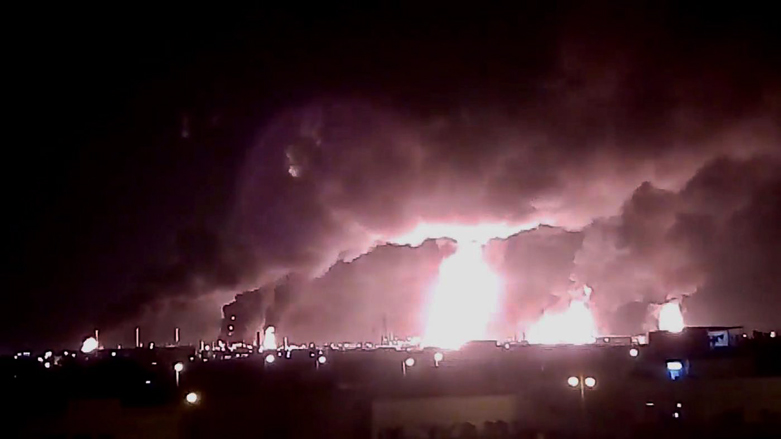US announces new Iran sanctions, more troops, equipment to Saudi Arabia, UAE

WASHINGTON DC (Kurdistan 24) – Washington announced on Friday two sets of measures that it is taking in response to Saturday’s drone and cruise missile attacks on Saudi oil installations.
The US has increased, yet again, its economic sanctions on Iran, while it is also sending additional forces and equipment to assist Saudi Arabia and the United Arab Emirates (UAE) in defending their territory.
Notably, US officials now clearly say that Iran was responsible for the attacks. As recently as Thursday, some officials seemed to suggest the issue remained unresolved and was still under investigation. That is no longer the case.
Following a late afternoon meeting at the White House, Secretary of Defense Mark Esper, along with Gen. Joseph Dunford, Chairman of the Joint Chiefs of Staff, announced the new US military measures.
“The attack on September 14th against Saudi Arabian oil facilities represents a dramatic escalation of Iranian aggression,” Esper said. “It is clear, based on detailed exploitation conducted by Saudi, the United States and other international investigative teams, that the weapons used in the attack were Iranian produced and were not launched from Yemen, as was initially claimed.”
“All indications are that Iran was responsible for the attack,” Esper affirmed.
Iranian-backed Houthi rebels in Yemen claimed responsibility for the September 14 attacks, and a Houthi military spokesman subsequently threatened both Saudi Arabia and the UAE with more assaults.
Both countries, which Secretary of State Mike Pompeo visited earlier this week, have asked for international support to aid in their protection.
Esper and Dunford both emphasized that the new deployments and equipment were not offensive, but intended to enhance Saudi and UAE defenses against air and missile attacks. They also stressed, consistent with President Donald Trump’s approach to burden-sharing in national security matters, that they would be looking “for other international partners” to contribute to the defense of the two Gulf states.
Asked about the number of US troops involved, Dunford characterized it as “moderate,” implying, hundreds, rather than thousands.
The second part of the US response is economic. Earlier on Friday, the Treasury Department announced a new round of sanctions on Iran, to include the Central Bank of Iran (CBI), as well as two other major financial institutions.
“Today’s action targets the CBI for its financial support to the IRGC-QF (Islamic Revolutionary Guard Corps-Quds Force) and Hizbollah,” a Treasury Department statement announced.
“In 2017, the IRGC-QF oversaw the transfer of tens of millions of euros to Iraq from the CBI,” and then CBI Governor, Valiollah Seif, directed the transfer, the statement said.
In 2018, the Treasury Department named the Iraqi bank as Al-Bilad Islamic Bank, explaining that it was used to transfer funds from Iran to Hizbollah. Seif and Al-Bilad, as well as Al-Bilad’s chairman, Aras Habib, were sanctioned then.
Speaking at a press conference on Friday, alongside visiting Australian Prime Minister, Trump said of the new measures, “These are the highest sanctions ever imposed on a country.”
That is simply not true. Much tighter sanctions were imposed on Iraq, following Saddam Hussein’s invasion of Kuwait in August 1990. Moreover, unlike today, when the US lacks support from Russia, China, and Europe, Saddam’s unprovoked attack on Kuwait was such an egregious violation of international norms that there was near-universal support for sanctions, including from the Soviet Union, China, and Europe.
Indeed, in 1990, Colin Powell, then Chairman of the Joint Chiefs of Staff, and Norman Schwarzkopf, head of CENTCOM, wanted to wait a year to see if those sanctions would force Saddam to withdraw from Kuwait.
However, US civilian authorities, including President George H.W. Bush, as well as the Saudis and Kuwaitis, judged that Saddam might well use that time to undermine and disrupt the coalition arrayed against him.
Bush decided on war, instead, and that war began five and a half months after Iraq invaded Kuwait.
It remains unclear what sanctions can achieve, when they are imposed on a dictatorial regime, bent on achieving an objective—whether it was Saddam and the occupation of Kuwait or, now, Iran and its pursuit of nuclear weapons.
Trump first responded to Saturday’s attacks on Saudi Arabia with a tweet on Sunday, suggesting a military response: “locked and loaded.” However, in the following days, he has backed away from that threat.
Read More: US looking for proof of Iranian responsibility for Saudi attacks, while sending mixed signals
Col. Norvell DeAtkine (US Army, Retired), who long taught the Middle East at Fort Bragg, expressed his doubts about the latest US measures.
“The Iranians are testing us, and finding us soft,” DeAtkine told Kurdistan 24. “We don’t want to get involved in another Middle Eastern war, and the Iranians know that. So they will keep pushing.”
“We need to retaliate,” DeAtkine said. “We can’t allow the Iranians to get away with this.”
